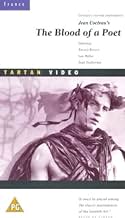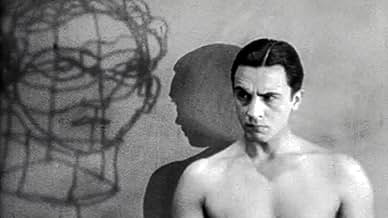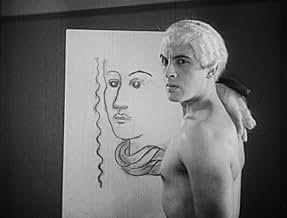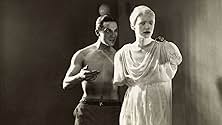Le sang d'un poète
IMDb RATING
7.2/10
7.8K
YOUR RATING
Told in four episodes - an unnamed artist is transported through a mirror into another dimension, where he travels through various bizarre scenarios.Told in four episodes - an unnamed artist is transported through a mirror into another dimension, where he travels through various bizarre scenarios.Told in four episodes - an unnamed artist is transported through a mirror into another dimension, where he travels through various bizarre scenarios.
- Awards
- 1 win total
- Director
- Writer
- All cast & crew
- Production, box office & more at IMDbPro
Featured reviews
Jean Cocteau was a French poet, painter, playwright, actor, as well as film maker, and was a huge part of the artistic community at the time. The Blood of a Poet (to use its English translation), is a very personal piece of avant-garde cinema, that reflects the ideas of the artist, and presented in a disjointed, surreal style, that is an enigma, even on viewing a second time.
The Blood of a Poet has four sections that seem to have no connection at all. We begin with Enrique Rivero as "the poet", who paints a face who's mouth begins to move. After erasing it with his hand, the mouth transfers to him. After pleasuring himself with the mouthed hand, the poet transfers it to a female statue, who orders him to climb through a mirror, where he enters a new realm, one that holds doors into which the poet views some strange scenes. In another sequence a boy is killed in a snow ball fight.
The Blood of a Poet was the first in what became Cocteau's Orphic Trilogy, which continued with Orphee (1950) and Le Testament d'Orphee (1960). It's slow, poetic movements through some very beautiful imagery, are in themselves interesting at times. The film is practically silent, except that there is a partial narrative (that incidentally is far too poetically esoteric that we get no indication of what is happening).
The film begins with a title card that states; "Every film is a coat of arms. It must be deciphered." This seems to be its intention, to be such a piece of art that its meaning requires unravelling. Whilst this kind of riddle is often pleasurable, in this cause it seems that you may need to know much about Cocteau himself - I have only read one biography of the man. Although, his film work does improve; the other two in the Orphic trilogy are splendid, along with his incredibly poet, and dreamily beautiful adaptation La Belle et la Bete (1946).
www.the-wrath-of-blog.blogspot.com
The Blood of a Poet has four sections that seem to have no connection at all. We begin with Enrique Rivero as "the poet", who paints a face who's mouth begins to move. After erasing it with his hand, the mouth transfers to him. After pleasuring himself with the mouthed hand, the poet transfers it to a female statue, who orders him to climb through a mirror, where he enters a new realm, one that holds doors into which the poet views some strange scenes. In another sequence a boy is killed in a snow ball fight.
The Blood of a Poet was the first in what became Cocteau's Orphic Trilogy, which continued with Orphee (1950) and Le Testament d'Orphee (1960). It's slow, poetic movements through some very beautiful imagery, are in themselves interesting at times. The film is practically silent, except that there is a partial narrative (that incidentally is far too poetically esoteric that we get no indication of what is happening).
The film begins with a title card that states; "Every film is a coat of arms. It must be deciphered." This seems to be its intention, to be such a piece of art that its meaning requires unravelling. Whilst this kind of riddle is often pleasurable, in this cause it seems that you may need to know much about Cocteau himself - I have only read one biography of the man. Although, his film work does improve; the other two in the Orphic trilogy are splendid, along with his incredibly poet, and dreamily beautiful adaptation La Belle et la Bete (1946).
www.the-wrath-of-blog.blogspot.com
A masterpiece of the avant-garde, Jean Cocteau's "The Blood of a Poet" demonstrates not just an extraordinary imagination at work but remarkable technical skill as well and you must remember that this was also Cocteau's first film. A young artist, (Enrique Rivera), brings a statue to life, on her instructions enters a mirror, (a sequence he was later to develop in "Orphee"), and finds himself in a strange hotel where nothing is real. Plot-wise, that's it but the imagery shows just what cinema was capable of even as early as 1932.
You could say it was also decidedly homoerotic. Cocteau's artist, his poet, is shirtless almost throughout and Cocteau puts great emphasis on his physicality at least until the midway point when the poet becomes a card player in full evening dress and the statue, his partner and film becomes a surreal satire on the bourgeoisie, (his object of desire is now a young, black angel). Of course, looking for any kind of meaning in a film like this is basically pointless; just give your soul over to it and hopefully you will find Cocteau's soul gazing back at you.
You could say it was also decidedly homoerotic. Cocteau's artist, his poet, is shirtless almost throughout and Cocteau puts great emphasis on his physicality at least until the midway point when the poet becomes a card player in full evening dress and the statue, his partner and film becomes a surreal satire on the bourgeoisie, (his object of desire is now a young, black angel). Of course, looking for any kind of meaning in a film like this is basically pointless; just give your soul over to it and hopefully you will find Cocteau's soul gazing back at you.
Excellent example of early surrealism on film. It is like going through a dream in which images come and go unbidden and with little apparent sense. This film is to be viewed in exactly that spirit. Switch off the need within you to make sense of it, to make it fit a linear state of mind and you will get the most out of it, and be a lot closer to what the director intended. Let the images wash over you, respond to them as images, not as tidy stories with beginnings, middles and endings that we are used to seeing in films. Like a dream it has it's haunting, almost familiar parts that we can know and recognize as well as the parts of our unconscious that we do not see as clearly but still we dream of them. Too bad surrealism in film never took off more than it did. Here we see a hint of the possibilities that still lie before us. Recommended highly.
Jean Cocteau's first film subject- Blood of a Poet (episodes 1-4), all takes place between a second's worth of measurement in time. A chimney falls to the ground in a scene of pure demolishment, and for the more mysterious glimpses in the film we see them happening in a second's flash as well (if you blink you'll miss it).
Before I saw Blood of a Poet, I figured it would be a debut Cocteau attempting a Bunuel type of filmic showcase of a different, though somewhat simple story with anarchic, subversively funny dream shots of a purely surreal nature. Then, there is the first shot, the opening image of the man, the introducer, like a ghost or a character in a Greek tragedy. The first episode is "Wounded Hand of the Scars of the Poet". Right from the music a viewer can realize Cocteau's picture is apart from Bunuel's achievement(s). The latter has a technique of classical music (Wagner over a scene of imposed seduction, for example) while Cocteau has the music as inviting, jubilant, even, however all the wigged man is doing is painting a face. It's almost like a cartoon, and for a fleeting instant, the face on the painting has lips that move. This is more than the usual surrealistic stoke of the brush- this is the first sign in motion picture history of an artist (i.e. painter) converting ideas into an episodic format. The purpose is the same- abstract thinking- but the format is of a different mind-set.
That's the first episode, that gets the viewer in, as another wigged man enters- sort of shocked- and exits like the wind. A wire face spins and the lips moving again like the painting he created just before. It could be the illusion of a lifetime, or a trick of the white light seeping out of the crevices in the lips in his hand, but the man, like us, can't ignore it until it is no more. That Cocteau has an intended poetic voice here in his brand of surrealism is a bonus of sorts to the intellectual type of audience member. And, it's not a downer to those who might not be interested in a filmmaker's ego- the artistry overcomes the ego, for the most-part anyway.
The second episode is titled "Do Walls Have Ears?", when the artist gets rid of the mouth, but now the man, the artist, is trapped in the room with the statue as the guardian. This is the first sign of the instantly narcissistic mood of Cocteau in the statue, a director in and of itself delivering enigmatic, haunting statement the mirror, again, shows with narcissism- the necessary narcissism, the kind to know one's self AND how he falls within himself like water. As the artist goes through the abyss, he winds up at the hotel (right in-between this Cocteau throws in a cut-away of a man disappearing after appearing for a number of seconds, creepy in its non-sense). Then, the artist views an execution through a key-hole in a door.
(Oh, did I mention that some of the dialog is quite possibly backwards- otherwise, what else could be the explanation of the point of it, except for random gibberish?)
Themes of suicide come up, then, soon enough after, the artist tires of this to the point of him leaving, climbing on the walls. At the end of this totally hypnotic two-parter, we see the reason, at the last for a clear instant, his emotion is now purely terror (by breaking the mirror, Cocteau tries to break through his own narcissistic tendencies).
The 3rd and 4th episodes are another kind of two-parter, and they center on a snowball fight and a card game, respectively. "The snowball fight" is entirely representative of the (true) brutal, near-primitiveness of the realities that go with childhood, leading up to a battered snowball victim at the side of an elegant man and woman dealing a game with each other. Suddenly, during this ("The Profanation of the Host" as it's appropriately titles) surrealism is at an astonishing height for its time. One shot, in particular, seemed to be an inspiration for a part of the Jupiter landing in 2001. A card is lifted from the boy, an assist in the game, and the man ends up losing, the boy (and the black man) revealing disgust in the elegance of the situation of the game.
That's when it hit me, the message of Blood of a Poet. Behind beauty, as well as behind one's own desires and vision, even if we can't entirely explain why it's beautiful or why we hold these desires for ourselves is the darkness that beckons (perhaps in the slightest of moments of our lives) in our deepest, most assuredly dream-like delusions of grandeur. From this, you could gather, Blood of a Poet seems like it may not be for everyone, certainly not for those who can't even remember one dream from their entire life (personally I thought it contained inklings of pretentious gobledy-gook). But its nature is something to look for, and if you only see the movie once, you might not be sorry. Grade: A
Before I saw Blood of a Poet, I figured it would be a debut Cocteau attempting a Bunuel type of filmic showcase of a different, though somewhat simple story with anarchic, subversively funny dream shots of a purely surreal nature. Then, there is the first shot, the opening image of the man, the introducer, like a ghost or a character in a Greek tragedy. The first episode is "Wounded Hand of the Scars of the Poet". Right from the music a viewer can realize Cocteau's picture is apart from Bunuel's achievement(s). The latter has a technique of classical music (Wagner over a scene of imposed seduction, for example) while Cocteau has the music as inviting, jubilant, even, however all the wigged man is doing is painting a face. It's almost like a cartoon, and for a fleeting instant, the face on the painting has lips that move. This is more than the usual surrealistic stoke of the brush- this is the first sign in motion picture history of an artist (i.e. painter) converting ideas into an episodic format. The purpose is the same- abstract thinking- but the format is of a different mind-set.
That's the first episode, that gets the viewer in, as another wigged man enters- sort of shocked- and exits like the wind. A wire face spins and the lips moving again like the painting he created just before. It could be the illusion of a lifetime, or a trick of the white light seeping out of the crevices in the lips in his hand, but the man, like us, can't ignore it until it is no more. That Cocteau has an intended poetic voice here in his brand of surrealism is a bonus of sorts to the intellectual type of audience member. And, it's not a downer to those who might not be interested in a filmmaker's ego- the artistry overcomes the ego, for the most-part anyway.
The second episode is titled "Do Walls Have Ears?", when the artist gets rid of the mouth, but now the man, the artist, is trapped in the room with the statue as the guardian. This is the first sign of the instantly narcissistic mood of Cocteau in the statue, a director in and of itself delivering enigmatic, haunting statement the mirror, again, shows with narcissism- the necessary narcissism, the kind to know one's self AND how he falls within himself like water. As the artist goes through the abyss, he winds up at the hotel (right in-between this Cocteau throws in a cut-away of a man disappearing after appearing for a number of seconds, creepy in its non-sense). Then, the artist views an execution through a key-hole in a door.
(Oh, did I mention that some of the dialog is quite possibly backwards- otherwise, what else could be the explanation of the point of it, except for random gibberish?)
Themes of suicide come up, then, soon enough after, the artist tires of this to the point of him leaving, climbing on the walls. At the end of this totally hypnotic two-parter, we see the reason, at the last for a clear instant, his emotion is now purely terror (by breaking the mirror, Cocteau tries to break through his own narcissistic tendencies).
The 3rd and 4th episodes are another kind of two-parter, and they center on a snowball fight and a card game, respectively. "The snowball fight" is entirely representative of the (true) brutal, near-primitiveness of the realities that go with childhood, leading up to a battered snowball victim at the side of an elegant man and woman dealing a game with each other. Suddenly, during this ("The Profanation of the Host" as it's appropriately titles) surrealism is at an astonishing height for its time. One shot, in particular, seemed to be an inspiration for a part of the Jupiter landing in 2001. A card is lifted from the boy, an assist in the game, and the man ends up losing, the boy (and the black man) revealing disgust in the elegance of the situation of the game.
That's when it hit me, the message of Blood of a Poet. Behind beauty, as well as behind one's own desires and vision, even if we can't entirely explain why it's beautiful or why we hold these desires for ourselves is the darkness that beckons (perhaps in the slightest of moments of our lives) in our deepest, most assuredly dream-like delusions of grandeur. From this, you could gather, Blood of a Poet seems like it may not be for everyone, certainly not for those who can't even remember one dream from their entire life (personally I thought it contained inklings of pretentious gobledy-gook). But its nature is something to look for, and if you only see the movie once, you might not be sorry. Grade: A
A magical little movie that, as another reviewer so well put it, 'means itself'. the imaginatively tame and purely cerebral, of course, shouldn't touch it. i don't much like cocteau's literary work and find it on the whole to be labored, monotonous, pretentious and boring. his verbal 'surrealism' never seemed to me to be worthy of the name, it just seemed like incomprehensible,almost annoyingly sarcastic jargon that made my eyes water. (like some of beckett's stuff.) but cinematically, i can't deny that he could pull it off--and how. i may not be a fan, but i recognize visual surreality when i see it, being an avowed surrealism addict. this one ranks up there with some of bunuel and bergman's stuff in terms of its sheer fascination and genuine merit, and as soon as i finished watching it i watched it again almost immediately. i repeat, don't even bothering trying to interpret it intellectually or rationally, and this applies to surrealist film as a whole. it appeals to the unconscious mind and the imagination, not to reason. (david lynch is the jean cocteau of our time!) A must.
Did you know
- TriviaBecause of the October 1930 scandal around Luis Buñuel's L'Âge d'or (1930) - another film financed by Le Vicomte de Noailles and Marie-Laure de Noailles, the Paris premiere of this film was delayed until January 1932.
- ConnectionsFeatured in Jean Cocteau: Autoportrait d'un inconnu (1983)
- How long is The Blood of a Poet?Powered by Alexa
Details
- Release date
- Country of origin
- Languages
- Also known as
- The Blood of a Poet
- Production company
- See more company credits at IMDbPro
- Runtime
- 55m
- Color
- Aspect ratio
- 1.37 : 1
Contribute to this page
Suggest an edit or add missing content

























